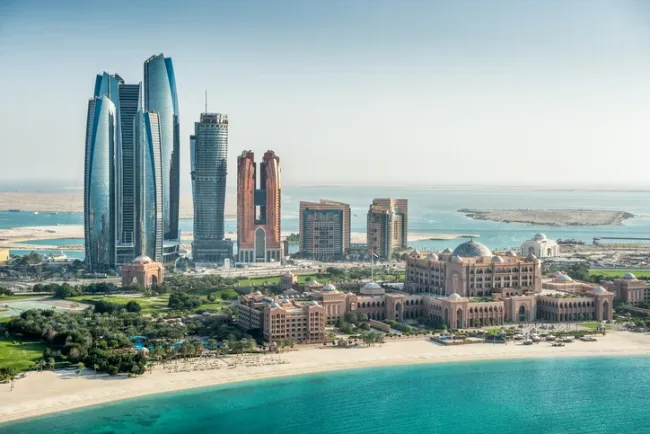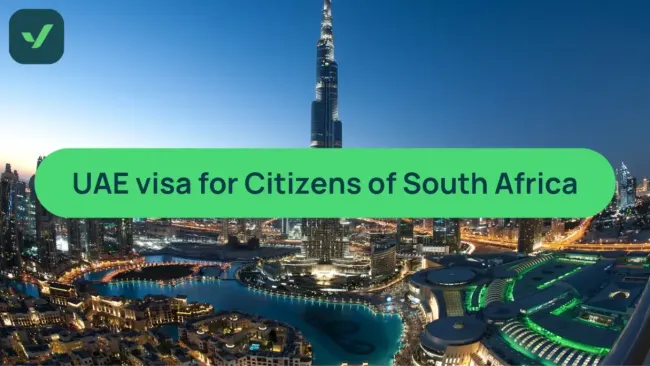
United Arab Emirates
Welcome to United Arab Emirates
Wondering if you need a visa for the United Arab Emirates (UAE)? This guide will help you figure out if you require a visa and which suits your travel plans best. A UAE visa grants access to the seven Emirates.

What's a UAE Visa On Arrival, and who's it for?
Who's the UAE Visa On Arrival for?
-
Citizens of over 70 countries, including but not limited to the United States, Canada, Australia, the United Kingdom, and most European Union countries.
-
Indian citizens holding US visas, green cards, UK Resident Permits, or EU resident permits.
Who's not eligible for a UAE Visa On Arrival?
-
Travelers not holding passports from eligible countries or those without a qualifying visa or residence permit from countries like the USA, UK, or the EU.
-
Citizens of GCC countries (Saudi Arabia, Bahrain, Qatar, the United Arab Emirates, and Oman) are visa-exempt.
What's the purpose of the UAE Visa On Arrival?
The Visa On Arrival is primarily intended for tourists and short-term business visits. It allows for tourism, short business trips, or transit stays.
How long can you stay with a UAE Visa On Arrival?
The duration of stay allowed under a Visa On Arrival can vary. Typically, it ranges from 14 to 180 days, depending on the traveler's nationality. In some cases, it can be extended for an additional period.
What's a UAE Tourist eVisa, and who's it for?
Who's the UAE Tourist eVisa for?
-
Citizens of over 100 countries, including Afghanistan, Bhutan, Cambodia, Dominica, Egypt, Indonesia, and more.
-
Residents of GCC countries.
Do you need to apply for a UAE Tourist eVisa? Use the Visa Checker Tool to find out.
Who's not eligible for a UAE Tourist eVisa?
-
Individuals from countries already qualifying for a visa on arrival or those from visa-exempt countries.
-
Citizens of GCC countries are also visa-exempt.
What's the purpose of the UAE Tourist eVisa?
It allows eligible travelers to visit the UAE for leisure, sightseeing, and short-term family visits. It's not intended for long-term stays, employment, or study purposes.
How long can you stay with a UAE Tourist eVisa?
The stay duration on a UAE Tourist eVisa can vary, but typically allows for a visit of up to 30 or 90 days, depending on the visa type issued. Some eVisas may be single-entry, while others might offer multiple-entry options. Extensions may be possible, subject to UAE immigration policies.
Learn more about the UAE Tourist eVisa.
What's a UAE Business Visa, and who's it for?
Who's the UAE Business Visa for?
Entrepreneurs, investors, and business professionals from countries that require a visa to enter the UAE for business purposes.
What's the purpose of the UAE Business Visa?
This visa allows you to:
-
Participate in business meetings, negotiations, and discussions.
-
Attend trade shows, conferences, and seminars.
-
Explore business opportunities, conduct market research, and establish business contacts.
How long can you stay with a UAE Business Visa?
The duration of stay allowed under a Business eVisa can vary, but is typically up to 30 days. Some visas may offer the option of a single entry, while others might allow multiple entries within a specified period. Extensions may be available, depending on the specific terms of the visa issued.
What's a UAE Medical Visa, and who's it for?
Who's the UAE Medical Visa for?
Foreign nationals who plan to undergo medical treatment at accredited healthcare facilities in the UAE.
What's the purpose of the UAE Medical Visa?
To facilitate access to medical treatments and healthcare services for international patients. It supports a wide range of medical procedures, including elective surgeries, specialized treatments, and comprehensive medical evaluations.
How long can you stay with a UAE Medical Visa?
Patients and their companions can stay for up to 90 days on a Medical Visa, with the option for one or more trips depending on the treatment schedule. This duration can cater to both short-term treatments and longer medical stays, depending on your specific healthcare needs.
What's a UAE Transit Visa, and who's it for?
Who's the UAE Transit Visa for?
This visa is for passengers transiting through the UAE's airports who don't qualify for visa-free entry or a Visa On Arrival.
What's the purpose of the UAE Transit Visa?
To allow travelers passing through the UAE to leave the airport for up to 48 or 96 hours.
How long can you stay with a UAE Transit Visa?
There are two types of Transit Visas: one that allows a stay of up to 48 hours, free of charge, and another for up to 96 hours for a fee. These visas aren't extendable and must be used within their validity period.
Learn more about the UAE Transit Visa
What are the UAE long-term visa options, and who are they for?

The UAE offers a variety of long-term visas to meet different needs, whether you're looking to study, work, invest, or even retire in this vibrant country. Here's a rundown of the more popular options.
-
Work visa: Issued to individuals employed in the UAE, this visa requires sponsorship from a UAE-based employer. It's suitable for professionals moving to the UAE for work.
-
Student visa: This visa is for those enrolled in full-time educational programs in the UAE. It's perfect for international students pursuing their studies at local universities or colleges.
-
Family visa:: If you're living in the UAE and want to bring your family over, this visa allows you to sponsor your spouse, children, and sometimes even your parents.
-
Residence visa: This category includes several types of visas for people who want to live in the UAE, covering employees, students, and those who qualify for residency without a local sponsor under specific conditions.
-
Golden visa: Aimed at investors, entrepreneurs, special talents, and exceptional students, offering them the opportunity to stay in the UAE for 5 to 10 years.
-
Retirement visa: For people over 55 wanting to retire in the UAE. There are certain financial requirements to meet for this visa.
-
Dubai Digital Nomad Visa: Designed for remote workers who want to live in Dubai while working for an employer based outside the UAE.
Please note that we don't handle applications for these long-term visas. For more detailed information, including how to apply and the specific requirements for each visa type, it's best to visit the Official Portal of the UAE Government.
Staying healthy in the UAE: Here's what you need to know
The UAE, a fusion of modern marvels and rich traditions, doesn't just enchant its visitors with its cultural depth but also provides top-notch healthcare facilities. Here's what you need to know to keep healthy while exploring the UAE.
Make sure to stay updated on routine vaccines
Ensure you're current with standard immunizations like measles-mumps-rubella (MMR), diphtheria-tetanus-pertussis, chickenpox, polio, and the flu vaccine before heading to the UAE.
The following vaccines are also recommended for travelers:
-
Hepatitis A: Advised due to potential exposure through food or water in the UAE, no matter how clean your eating place looks.
-
Hepatitis B: Suggested for travelers who may engage in activities that increase their risk of bodily fluid exposure, such as sexual activity, tattooing, piercing, or medical procedures.
-
Measles: Advised for babies from 6 to 11 months old, considering the global outbreaks in recent times.
-
Rabies: Not a significant risk for all visitors but recommended for those engaging in outdoor activities that might bring them into contact with animals like bats, dogs, and other mammals.
-
Typhoid: Advisable for those who love to explore local cuisines and will be spending time in less urbanized areas, as typhoid can be contracted through contaminated food or water.
-
Yellow fever: Travelers over 9 months old from countries with a risk of yellow fever transmission must show a vaccination certificate. This also applies to those who've transited more than 12 hours through an airport in a country at risk of yellow fever.
-
Keep up with the UAE's COVID-19 policies, including quarantine, testing, or vaccination requirements, by checking with your airline or visiting the National Emergency and Crisis and Disasters Management Authority (NCEMA) website.
Medical facilities
The UAE offers various healthcare services, with hospitals and clinics equipped with cutting-edge technology and operated by highly qualified professionals.
-
Cities like Dubai and Abu Dhabi offer a broad spectrum of healthcare services, meeting everything from urgent care needs to specific medical treatments.
-
Private healthcare facilities are known for their superior care, attracting many expatriates and visitors. These places are often preferred for their convenience and English-speaking personnel.
-
Pharmacies are easy to find and stocked with a range of prescription and over-the-counter medications. Nonetheless, it's a good idea to carry any necessary medication you're already taking along with your prescription, just in case.
Health insurance
Having travel health insurance during your trip is strongly recommended.
Healthcare, especially at private facilities, can be expensive. Your insurance should cover major costs, including if you need to be evacuated in a medical emergency.
Make sure to check with your insurance company to ensure your plan is comprehensive, covering you for:
-
Compensation for any issues with your travel plans, such as cancellations, delays, or disruptions.
-
Medical treatment expenses and evacuation if necessary.
-
Reimbursement for lost baggage.
Things to be aware of when visiting the UAE

When visiting the UAE, there are several health and safety considerations, cultural norms, and legal requirements that travelers should be aware of to ensure a safe and respectful visit.
-
Extreme heat: The UAE's desert environment means it can really heat up. Stay hydrated, apply sunscreen, and choose light, breathable clothing to stay comfortable.
-
Cultural sensitivity: The UAE is a Muslim country, and local customs and laws reflect this. Dress modestly in public places like malls and eateries. During Ramadan, be aware that eating and drinking in public during daylight isn't permitted.
-
Water and food safety: While you can generally drink tap water in the UAE, if you're prone to stomach troubles, bottled water might be a safer bet. Be cautious with street food and opt for food that's been properly cooked.
-
Local laws and etiquette: Brush up on local regulations to avoid any mishaps. Alcohol consumption is restricted, drug laws are stringent, public displays of affection should be minimal, and photographing certain buildings, like government and military facilities, is off-limits.
-
Environmental risks: Sand and dust storms can occur and impact air quality. If you have respiratory issues, it's best to stay indoors during major storms and maybe use an air purifier.
-
Photography: Be careful when taking pictures, particularly of government buildings, military areas, or individuals who haven't agreed to be photographed. Unauthorized photography can lead to legal trouble.
Medication for personal use
If you plan to take your medication to the UAE, here are some important tips to follow.
-
Declare all medications: Always inform customs about any medications you're bringing into the country, especially prescription or controlled substances.
-
Original packaging is a must: Keep your medications in their original packaging, clearly labeled with your name and the prescription.
-
Carry a prescription or doctor's note: Bring documentation from your doctor, such as a note or a current prescription, explaining why you need the medication.
-
Check for restrictions: Make sure none of your medications are prohibited or tightly controlled in the UAE. To bring certain medications, you'll need approval. You can apply online via the electronic application form. For the latest details, it's wise to reach out directly to the UAE Ministry of Health website.
-
Only take what you need: To minimize complications, pack only the medication you'll need for your trip.

 Australia ETA Online
Australia ETA Online
 United Kingdom ETA
United Kingdom ETA
 India Tourist eVisa
India Tourist eVisa
 Canada ETA Visa
Canada ETA Visa
 Turkey eVisa
Turkey eVisa
 Egypt eVisa
Egypt eVisa
 Singapore SG Arrival Card
Singapore SG Arrival Card
 Indonesia eVoa Visa
Indonesia eVoa Visa
 Aruba ED Card
Aruba ED Card

